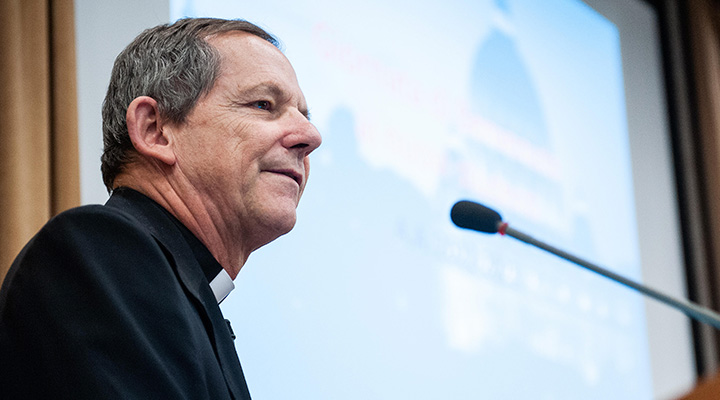
Don Luis Navarro, born in San Sebastián, rector of the Pontifical University of the Holy Cross in Rome since 2016, in addition to being a professor and former dean of the Faculty of Canon Law at this university and president of the Conference of Rectors of the Roman Pontifical Universities. In an interview for TRECE, he explained that Holy Cross students come from more than 90 countries: "You walk through the corridors and it seems like you are at the United Nations," Dr. Navarro affirmed with emotion.
He also spoke of the importance and academic level of the Faculty of Institutional and Social Communication, which is unique in the world: "It is a necessity in ecclesiastical life. The media are extremely important and being in good relations with journalists is fundamental for the Church. Besides, the Church has to learn and is learning to inform with truthfulness and transparency so that many people can know the reality of the institution founded by Jesus Christ".
Many of the students who are trained at this university later become the spokespersons of the Episcopal Conferences of their respective countries, or of their dioceses, or of their congregations.
- In Rome there are several pontifical and ecclesiastical universities. Each one imparts the theological and philosophical formation necessary for the formation of priests and laity, but each one brings some particular characteristic. What do you think is the personal hallmark of Holy Cross?
In Rome there are seven pontifical universities and fifteen centers including athenaeums, faculties, institutes and academies. The Conference of Rectors of Ecclesiastical Universities of Rome, which I have the honor to preside, has a total of twenty-two members. All of them make a valuable contribution, each with its own personality. Approximately eight thousand students are trained in these centers. Many of them come to Rome to study philosophy and theology as part of their preparation for the priesthood.
And it is clear to us that the particular stamp of the Santa Croce is made up of two elements: on the one hand, the personalized attention of each student, whom we try to accompany in their years of stay in Rome, in various aspects: academic, accommodation solutions, access to scholarships; and, on the other hand, the seriousness of the studies, which is manifested in the way classes are conducted, the availability of professors, the follow-up of doctoral theses and, I would even say, the care of the facilities.
- As for the seminarians, priests and religious who study theology at Holy Cross, why do you think, in your opinion, they choose this university?
As is generally the case with ecclesiastical and civil universities, there are many reasons for choosing, but there are two that prevail: academic reputation and the city where the center is located. I think that the Santa Croce is no exception. The importance of being headquartered in Rome needs no explanation.
With regard to academic prestige, which has been consolidated in our almost 40 years of life, I believe that there is an outstanding factor: almost all of our professors have the ecclesiastical academic degrees required by Church legislation and also civil university degrees. This contributes to a greater sensitivity to the problems of the men and women of our time. This preparation helps the new evangelization to which Pope Francis has called us.
- In your opinion, when students finish the studies they receive at Holy Cross, what are the main characteristics they have received from this university, what do they say about it, what is their degree of satisfaction?
From the most recent student surveys, we know that their level of satisfaction is high. And from what the alumni tell us, one of the factors they value most is the help provided by the professors, their availability and closeness. There is a lot of evidence that confirms what I said at the beginning: a university fulfills its mission when it is serious in its academic work and close in its personal attention to students.
- The Faculty of Institutional and Social Communication of Holy Cross is unique in Rome, whose fundamental objective is that priests, religious and lay people communicate to society the actions and message of the Church and that they have a good relationship with journalists and the media. What is the key at this time to achieve this good communication between the Church and society?
Indeed, the Faculty of Communication, now in its 25th year, is a pioneer in its field. It was born out of the conviction of the importance of communicating the faith. I think it rests on two pillars, which characterize professors and students: on the one hand, a deep love for Christ and the Church and, consequently, a sincere desire to participate actively in the evangelizing mission.
And on the other hand, a marked sense of professionalism as communicators, that is, as people who are always looking for the best way to transmit the faith through different channels, thinking of the recipients, learning new languages. This harmonization - a life of faith and professionalism - is what the faculty seeks to foster.
Marta Santín, Journalist specializing in religious information.